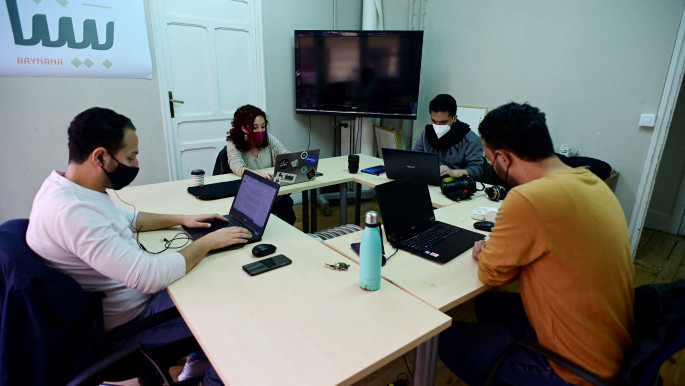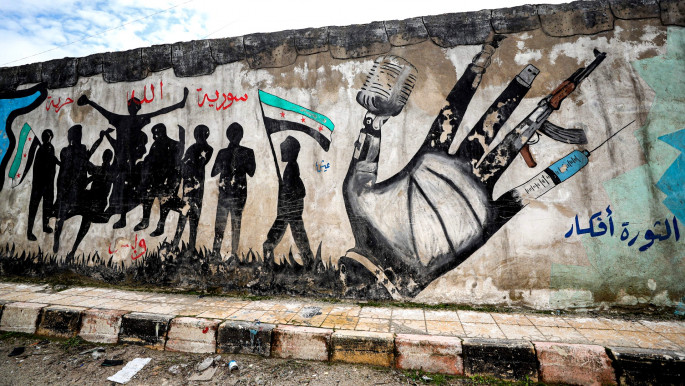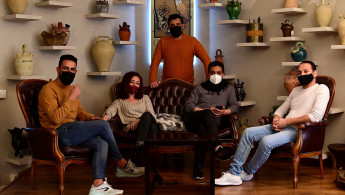Syrian refugees create Spain's first Arabic news outlet to fight communal stigma and fears
Al-Ghareeb, his wife and two young daughters packed their life up and left their country, family, and friends behind in search of greener pastures. They spent two days walking until they were able to cross the border into Turkey.
While there, he met fellow Syrian journalists Muhammed Subat, Okba Mohamed and Moussa al-Jamaat. Shortly after, the four of them were repatriated to Spain by the Committee to Protect Journalists, settling in the country's capital, Madrid.
Last month, they launched Baynana, Spain's first refugee-run outlet as well as the country's only Arabic news outlet exclusively dedicated to, and run by, the country's Arabic community.
"We thought we could help other people like us," says al-Ghareeb. "We want to show the struggles and the dreams of migrants and refugees, which are similar to those of everybody else."
Baynana – Arabic for 'between us' – has been established with the aim of dismantling myths and breaking down negative stereotypes surrounding Spain's Arabic and migrant community and to strengthen ties between Spain and the Arab region.
 |
Our goal is to re-humanise or individualise people who come from outside who, at the end of the day, are exactly like us |  |
"At Baynana we want to do things a little differently. We want to showcase positive stories of refugees, provide useful information and show the other side of migration in Spain. Almost all Spanish outlets speak about migrants or refugees as victims but that is not the reality," says Subat.
The latest analysis into media portrayal carried out by Red Acoge, the nationwide federation of migration-focused NGOs, found that in 2019 over 55 percent of media content used incorrect language surrounding issues of refugees and migration.
"Different linguistic practices that generate stereotypes and prejudice have been identified through dehumanising, alarmist or criminalising constructions. This includes the use of the word 'illegal' in reference to migrants, the use of metaphorical, hyperbolic or belligerent language, or the prioritisation of a person's administrative condition before their human one. It is a systemic problem that worsens when its use is intentional," the report reads.
Baynana was created with the help of local journalistic organisation Por Causa and their member Andrea Olea, who has coordinated the project and helped get it off the ground. Her role is temporary as she intends to step back once the outlet has fully found its feet.
 |
| Baynana is Spain's first refugee-run outlet, as well as the country's only Arabic news outlet exclusively dedicated to, and run by, the country's Arabic community [Javier Soriano/AFP via Getty Images] |
"Our goal is to re-humanise or individualise people who come from outside who, at the end of the day, are exactly like us. If an outlet like ours serves as a platform to reflect other voices the readership is going to perceive that. At the end of the day they're seeing people like themselves writing about the same things they have lived through," Olea explains.
"In Spain anti-migration discourse is the realistic and pragmatic one, while a positive discourse on migration is classed as paternalistic. Spain needs immigration both in terms of demographics and to uphold social security. It's a reality and is not being seen, it's omitted. In part, it is also omitted because the discourse of fear is what sells, the 'us against them'."
Baynana is also the result of administrative and institutional shortcomings that have hindered many migrants and refugees in Spain. In 2020, 88,762 people applied for international protection and asylum in Spain, of which a whopping 77 percent – or 68,435 applications – were rejected, according to government figures.
 |
At Baynana we want to do things a little differently. We want to showcase positive stories of refugees, provide useful information and show the other side of migration in Spain |  |
Applications filed by Syrians made up 1,478 of those, with 949 of them rejected and 529 of them approved. Only five Syrians were granted refugee status, compared to 35 in 2019, with the remainder given subsidiary protection – protection given to a person who does not qualify as a refugee, but is still deemed to be under severe risk or danger if they return to their home country.
In 2019, Spain refused entry to more applicants than all other 27 EU member states combined.
"When we arrived in Spain we looked for information on how to do our paperwork and settle into the country, but we couldn't find anything of use. That's why we decided to set up an outlet for the Arabic community in Spain, because it's necessary for them to be able to find helpful information that we were not able to," says al-Ghareeb.
According to the Spanish Commission for Refugee Aid (CEAR), Spain only granted asylum to a mere 5 percent of applications processed last year, far below the European average of 33 percent.
 |
The Spanish Observatory for Racism and Xenophobia found that 87% of Muslims face discrimination when finding housing, and 83% suffer it when looking for work |  |
The drastically low rate of approval is a result of a large backlog of pending cases accumulated over the recent years, combined with a structural lack of material and human resources to deal with the paperwork. Between 2017 and 2019, the number of pending cases rose from approximately 35,000 cases to over 111,740.
This has landed many migrants and refugees in bureaucratic limbo, including Sabat, al-Ghareeb, Mohamed and al-Jamaat. Despite all having touched down in Spain in 2019, their applications are all still pending approval and the four of them are living on temporary residency permits that expire every six months.
 |
| Read also: In the shadows of Syria's revolution, a generation of activists are born |
"We've been here for almost two years and we don't know anything about it. We've been waiting for four months to try and get an appointment with the Department of Immigration but these things take a long time," al-Ghareeb explains.
Al-Ghareeb and his colleagues are aware of this reality and the difficulty of the bureaucratic process. The European Council's Asylum Information Database found that the average processing time for an asylum application in Spain in 2018 was 473 days. Syrian applications took an average of 288 days to process, with 505 days for Afghans and 633 days for Iraqis.
Al-Ghareeb also points out that further administrative and financial uncertainty lies ahead, as he says the government subsidy programme they are under offers a maximum of two years of support, an expiry date that is fast approaching for the four Syrians.
On top of this, Syrian and Arab migrants are also burdened with societal scrutiny. Baynana is born into a Spanish society that continues to grapple with issues of Arab and African migration and the integration of Muslim foreigners.
In recent years, fake news in Spain has been increasingly used as a tool through which to vilify and attack refugees and migrants, with Arab and muslim migrants becoming a particular target. False videos, reports, and images depicting fake abuse of benefits, stabbings, robberies and more have been shared extensively online targeting these groups.
Between 2017 and 2020, the fact-checking organisation Maldita Migración identified 321 items of migration and religion-related fake news; 168 of those were based explicitly on migration and 129 were based solely on religion, with 70 percent of the latter targeting Islam directly, according to the Disinformation, Religious Minorities and Hate Speech report published last year.
|
"In Spain, misinformation that targets the migrant and refugee population is among the most common. This misinformation represents immigrants as violent people or criminals who are a danger to society and have no interest in integrating themselves. It also tries to reinforce the idea that they have privileges ahead of nationals when it comes to government benefits and that migrants, in particular Muslim ones, will impose their culture and that the state will allow it."
"We've seen that these narratives aren't dying down, but instead there are increasingly relevant channels that promote them and have become part of the political discourse of our country," says Natalia Diez, journalist and migration fact-checker at Maldita Migracion.
Between 2017 and 2019, the country's Interior Ministry found that cases of Islamophobic hate has increased by 120 percent citing 103 instances, whereas the independent organisation Citizen Platform against Islamophobia recorded 546 cases in 2017 alone, more than five times the cases the government recorded.
Earlier in the year, the far-right party Vox had its Twitter account temporarily suspended for 'inciting hate' against Muslims after launching an online campaign under the hashtag #StopIslamisation.
"Arriving in Spain was great because it's a safe place full of kind people, but there's also a lot of racism and hate towards people like us, people who have come from another country. There's a lot of hate and a lack of resources, so immigrants have a lot of problems," al-Ghareeb says, both al-Jamaat and Sabat nodding in agreement.
Al-Jamaat and al-Ghareeb consider this hate and racism to be among the biggest obstacles of their integration in Spain, alongside finding housing and work.
Read more: Refugees and democracy are dying at Europe's front door
The Spanish Observatory for Racism and Xenophobia found that 87 percent of Muslims face discrimination when finding housing, and 83 percent suffer it when looking for work. Al-Ghareeb points out that it took him four months to find a home for his family, while Mohamed also reveals he was denied housing by a private landlord due to his Muslim beliefs.
Despite the tortuous road the Syrian quartet have faced to resettle in Spain and launch Baynana, they are aware that for it to have its desired impact its long term survival is key. In hopes of ensuring survival they have set up a crowdfunding page to build a budget to keep them afloat as they get off the ground.
Their return to Syria is a distant dream shrouded in uncertainty, though one thing is clear.
"Getting to this point is difficult, launching a project like this is hard for Spaniards, let alone refugees. Our dream is to return to our country as people who have achieved something, not just people who fled Syria to receive benefits and not do anything. We want to return home as brave men, as a strength. That's what we want," Sabat says.
Inigo Alexander is a freelance journalist whose work focuses on Spain, Latin America and social justice. His work has appeared in The Guardian, The Daily Telegraph, The Local, NACLA, among others
Follow him on Twitter: @Inigo_Alexander


![President Pezeshkian has denounced Israel's attacks on Lebanon [Getty]](/sites/default/files/styles/image_684x385/public/2173482924.jpeg?h=a5f2f23a&itok=q3evVtko)



 Follow the Middle East's top stories in English at The New Arab on Google News
Follow the Middle East's top stories in English at The New Arab on Google News


